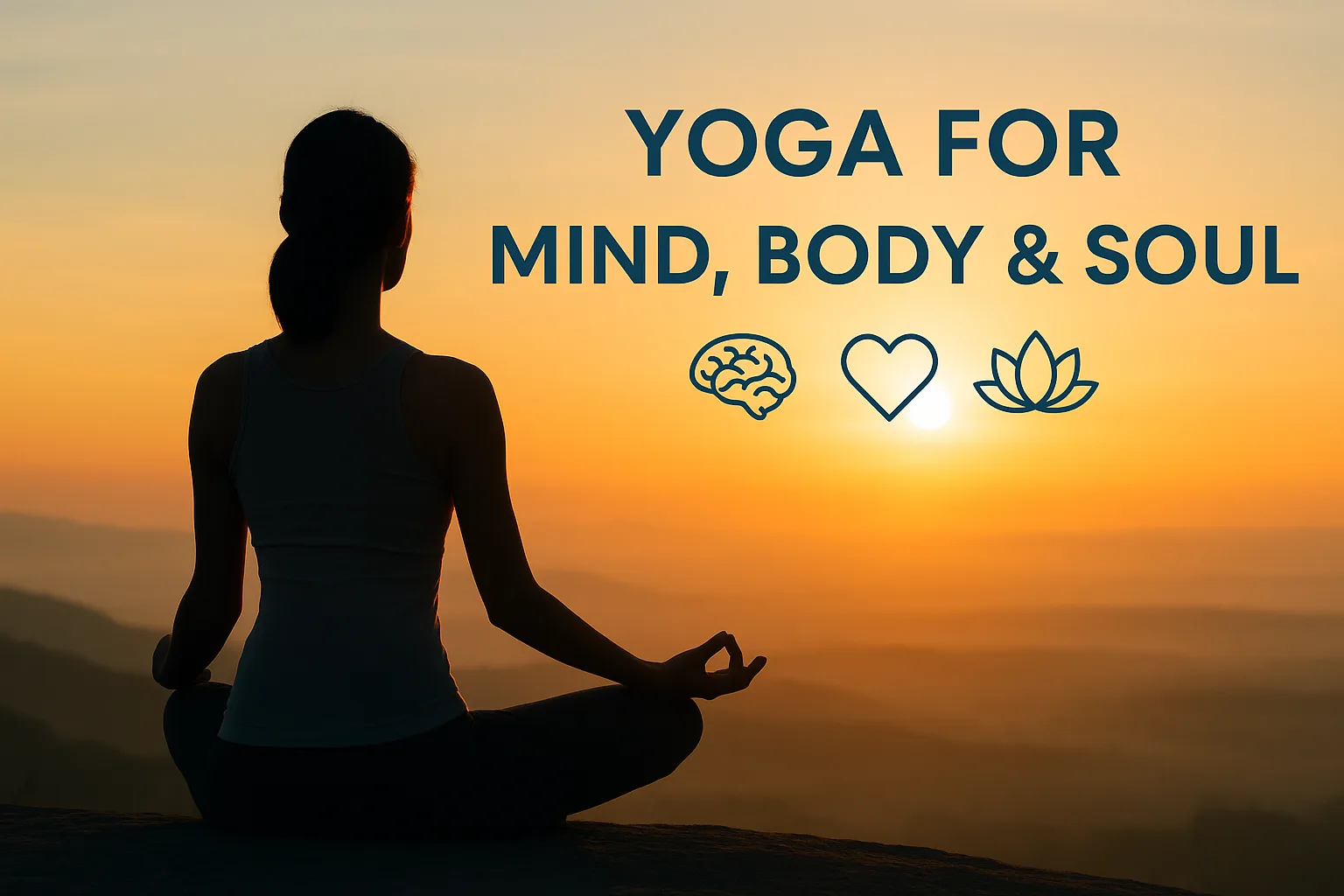Yoga for Mind, Body, and Soul
Introduction: The Holistic Power of Yoga
Yoga for mind body and soul is much more than a fitness trend—it is a timeless practice that unites all aspects of our being. Rooted in ancient Indian philosophy, yoga means “union,” symbolizing the harmony between physical, mental, and spiritual dimensions of life. Today, yoga for mind body and soul is embraced globally for its ability to heal, energize, and transform lives.
Whether you are looking to reduce stress, enhance physical strength, or seek inner peace, yoga offers a personalized path to wellness. Let’s explore how yoga works its magic across all three vital levels—mind, body, and soul.
:
👉 Looking to start your yoga journey? Shop our premium yoga mats here for the perfect foundation in every pose.
Yoga for the Body: Strength, Flexibility, and Healing
1. Improves Physical Strength and Flexibility
Yoga poses, also known as asanas, are designed to stretch, strengthen, and tone muscles. From basic postures like Tadasana (Mountain Pose) to advanced ones like Bakasana (Crow Pose), each movement activates specific muscle groups.
Regular yoga practice:
Improves posture and alignment
Increases muscle flexibility
Enhances joint mobility
Strengthens the core and spine
2. Supports Weight Management
While yoga isn’t a high-calorie-burning workout like HIIT, it promotes weight loss by increasing mindfulness and reducing emotional eating. Practices like Power Yoga or Vinyasa Flow can also burn significant calories while building lean muscle.
3. Enhances Immunity and Organ Function
Many yoga poses stimulate internal organs, improving digestion, detoxification, and immunity. Twisting poses, such as Ardha Matsyendrasana (Half Lord of the Fishes), help flush toxins from the digestive system, while backbends strengthen the nervous system.
4. Reduces Physical Pain
Yoga is widely recommended for managing chronic pain conditions like backache, arthritis, and fibromyalgia. Gentle forms like Yin Yoga or Restorative Yoga provide deep tissue relaxation and pain relief.
Yoga for the Mind: Calm, Focus, and Emotional Balance
1. Reduces Stress and Anxiety
One of yoga’s most profound effects is stress reduction. The practice of Pranayama (breathing techniques) and Dhyana (meditation) calms the nervous system and lowers cortisol (the stress hormone). Just 10 minutes of deep breathing can drastically reduce anxiety levels.
Popular techniques include:
Anulom Vilom (Alternate Nostril Breathing)
Bhramari (Bee Breath)
Ujjayi (Ocean Breath)
2. Increases Mental Clarity and Focus
Yoga improves mental agility by training the brain to remain in the present moment. The focus required during poses naturally enhances concentration, awareness, and decision-making skills.
Techniques like Trataka (candle-gazing meditation) are especially useful for sharpening attention and overcoming distractions.
3. Boosts Mood and Emotional Stability
Practicing yoga regularly boosts serotonin and dopamine levels—neurotransmitters responsible for feelings of happiness and well-being. This makes yoga a powerful tool for managing depression and emotional burnout.
4. Encourages Self-Awareness and Mindfulness
Through introspective practices like Yoga Nidra (Yogic Sleep) or Bhakti Yoga (devotional yoga), individuals cultivate mindfulness and emotional intelligence. This self-awareness helps people make healthier life choices and build better relationships.
Yoga for the Soul: Connection, Purpose, and Inner Peace
1. Awakens Spiritual Energy
Yoga is inherently a spiritual journey. Practices such as Kundalini Yoga focus on awakening the energy at the base of the spine and channeling it through the chakras. This can lead to heightened states of awareness and inner awakening.
2. Deepens the Sense of Connection
Yoga fosters a deep connection with oneself, others, and the universe. Whether it’s chanting Om, meditating in silence, or practicing Seva (selfless service), yoga cultivates unity and compassion.
3. Encourages a Purposeful Life
The philosophical teachings of yoga—outlined in texts like the Bhagavad Gita and Yoga Sutras of Patanjali—guide individuals toward Dharma (righteous path) and Moksha (liberation). This helps people find clarity, purpose, and meaning in their lives.
4. Leads to Inner Peace
Ultimately, yoga leads to Samadhi—a state of blissful union and inner peace. In this state, the fluctuations of the mind subside, and a person experiences contentment beyond material possessions.
Types of Yoga for a Balanced Life
Each person’s journey is unique, and different types of yoga suit different needs:
| Yoga Type | Purpose |
|---|---|
| Hatha Yoga | Foundation poses and breathing |
| Vinyasa Yoga | Flowing sequences with breath coordination |
| Ashtanga Yoga | Discipline and strength-building |
| Yin Yoga | Deep tissue stretch and relaxation |
| Kundalini Yoga | Spiritual awakening and energy balance |
| Restorative Yoga | Healing and rejuvenation |
| Bhakti Yoga | Devotion and emotional connection |
Tips for Integrating Yoga Into Daily Life
Start with 10 Minutes Daily: You don’t need to commit an hour each day. Begin with short sessions and gradually increase.
Create a Peaceful Space: Designate a quiet area in your home for yoga and meditation.
Use Guided Videos or Attend Classes: Online classes or local yoga studios can provide structure and motivation.
Practice Gratitude: End your sessions by mentally listing things you’re grateful for.
Stay Consistent: Like any habit, yoga requires commitment. Even a short, daily practice is better than occasional long sessions.
Conclusion: The Union of Mind, Body, and Soul
Yoga is not just an exercise—it’s a way of life. It strengthens the body, calms the mind, and nourishes the soul. As we face increasing stress, disconnection, and health challenges in modern life, yoga offers a timeless remedy. Whether you are a beginner or a seasoned practitioner, yoga invites you to reconnect with your true self and find lasting peace and vitality.
So roll out your mat, take a deep breath, and begin your journey toward holistic well-being—one pose at a time.





 No products in the cart.
No products in the cart.